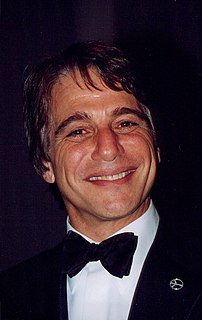A Quote by Alex Gibney
Steve Jobs did not start started Apple as a scam. But he understood early on the power of marketing. The idea of the computer as a bicycle for the human mind - I think that was something he believed. He believed in making people comfortable with these machines, which is why he spent so much time thinking about how to design them a certain way, how to make them so user-friendly and interactive, and why he spent so much time studying the Zeitgeist.
Quote Topics
About
Apple
Believed
Bicycle
Certain
Certain Way
Comfortable
Computer
Design
Did
Early
Friendly
How
Human
Human Mind
Idea
Interactive
Jobs
Machines
Make
Making
Marketing
Mind
Much
People
Power
Scam
So Much Time
Something
Spent
Start
Started
Steve
Studying
Them
Think
Thinking
Time
Understood
User
User-Friendly
Way
Which
Why
Zeitgeist
Related Quotes
But why do only unimportant things?" asked Milo, who suddenly remembered how much time he spent each day doing them. "Think of all the trouble it saves," the man explained, and his face looked as if he'd be grinning an evil grin--if he could grin at all. "If you only do the easy and useless jobs, you'll never have to worry about the important ones which are so difficult. You just won't have the time. For there's always something to do to keep you from what you really should be doing, and if it weren't for that dreadful magic staff, you'd never know how much time you were wasting.
How much time have you invested in thinking about strategy? How many options have you considered before the plan was written? How have you ensured that the thinking behind the plan is challenged? How much time do you spend exploring trends, possibilities and cool stuff? How much time is spent playing with ideas, hopes and dreams?
Audience interest is directly proportionate to the presenter's preparation. You better spend time and energy on any presentations where the stakes are high. If you are trying to close a large sale or speak at a conference to an audience of potential clients, you better be ON your game. An audience can tell how much energy you spent on your presentation, which is a reflection of how much you valued their time. If they gave you an hour of their time, you need to make it worth it to them by treating their time as a valuable asset by making the content valuable to them.
I like dreams. I think there's a lot of information in them. I spent a lot of time on Jungian analysis and dreams are an elemental part of that process. Carl Jung believed very much in the power archetypes in dreams, what dream imagery means, and how you can tie it into deeper self examination. It's a big part of the therapeutic process.
[...] intelligent people only have a certain amount of time (measured in subjective time spent thinking about religion) to become atheists. After a certain point, if you're smart, have spent time thinking about and defending your religion, and still haven't escaped the grip of Dark Side Epistemology, the inside of your mind ends up as an Escher painting.
I have to go into the studio to make my second album knowing I'm making an album. When I first started making songs I didn't have an album in mind, that's why a lot of them I like - I'm talking about how I haven't got a deal, how I'm living, you can never really top the first time, but we'll see how it goes.
I am a nonbeliever myself. But I think there's so much about religion that is not factual in nature as to why people engage with it and what it means to them. You can debunk why you think there's no physical evidence for God and why the story of Jesus didn't really happen that way and stuff like that all the live-long day, and it's not going to make a difference to what role religion has in people's lives and how they feel about it and how it makes their lives better or worse.
How much courage does it take to fire up your tractor and plow under a crop you spent six or seven years growing? How much courage to go on and do that after you've spent all that time finding out how to prepare the soil and when to plant and how much to water and when to reap? How much to just say, "I have to quit these peas. Peas are no good for me, I better try corn or beans.
I'm friends with a lot of writers and so many of them say how much they hate signings and how they leave after a certain period of time. But what is so hard about sitting there while people tell you how much they love you? And if you don't like it, well, learn to like it. I try to take one person at a time. I never look down the line to see how many more people are left. And I always try to make people talk about something besides whatever they planned to say.





































